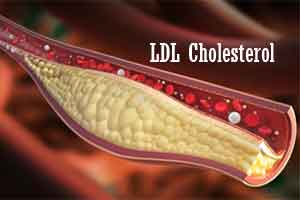- Home
- Editorial
- News
- Practice Guidelines
- Anesthesiology Guidelines
- Cancer Guidelines
- Cardiac Sciences Guidelines
- Critical Care Guidelines
- Dentistry Guidelines
- Dermatology Guidelines
- Diabetes and Endo Guidelines
- Diagnostics Guidelines
- ENT Guidelines
- Featured Practice Guidelines
- Gastroenterology Guidelines
- Geriatrics Guidelines
- Medicine Guidelines
- Nephrology Guidelines
- Neurosciences Guidelines
- Obs and Gynae Guidelines
- Ophthalmology Guidelines
- Orthopaedics Guidelines
- Paediatrics Guidelines
- Psychiatry Guidelines
- Pulmonology Guidelines
- Radiology Guidelines
- Surgery Guidelines
- Urology Guidelines
Inclisiran has sustained LDL-C lowering potential with twice a year dosing: JAMA Study

London, England: Lowering low density lipoprotein cholesterol (LDL-C) is key to a healthy heart and preventing cardiovascular disease. Statins are the mainstay treatment for lowering of the bad cholesterol as supported by all lipid guidelines. Now, a recent study has found a novel approach to Low density lipoprotein reduction with the convenience of infrequent dosing.
According to the one-year follow up from the ORION-1 Trial, treatment with inclisiran helped in durable reduction in LDL-C over 1 year. The study is published in the journal JAMA Cardiology.
Statins are the first-choice treatment across all lipid guidelines for lowering low-density lipoprotein cholesterol (LDL-C). Many patients till fail to achieve the required lipid-lowering (for the prevention of cardiovascular disease) with a statin and require additional therapies that places an additional medication burden on the patients and also leads to lower compliance with therapeutic regimens. Additional lipid-lowering therapies can range from small molecules, such as ezetimibe, which require daily dosing or monoclonal antibodies that require a twice to the once-monthly dosing regimen. Furthermore, it was seen that with small molecules that require daily dosing, adherence is associated consistently with outcomes.
Inclisiran is an investigational small interfering RNA that inhibits proprotein convertase subtilisin/Kexin type 9 (PCSK9) synthesis in the liver and has a long duration of action, which may offer a convenient dosing regimen for patients who require significant LDL-C lowering.
Kausik K. Ray, Imperial College London, London, England, and colleagues determined whether inclisiran reduces mean LDL-C exposure with an infrequent dosing regimen.
The study involved 501 participants (65% were men, mean age was 63 years, 6% had familial hypercholesterolemia, and 69% had established ASCVD) with elevated LDL-C despite maximally tolerated statin therapy. The participants were then followed up monthly for LDL-C levels and proprotein convertase subtilisin-Kexin type 9 (PCSK9) measurements, as well as safety until their LDL-C levels, had returned to within 20% of their change from baseline (maximum 360 days). Data were analyzed between January 11, 2016, and June 7, 2017. Baseline LDL-C was 128 mg/dL among 501 randomized participants.
Key findings include:
- The percentage of participants who were followed up to day 360 because their LDL-C levels had not returned to within 20% of their change from baseline ranged from 48.3% to 65.0% for those receiving a single dose and between 55.9% and 83.1% of those receiving 2 doses, with similar effects observed for PCSK9.
- Time-averaged reduction in LDL-C levels over 1 year after a single dose ranged from 29.5% to 38.7% and from 29.9% to 46.4% for those who received 2 doses.
- The 2-dose 300-mg regimen produced the highest proportion of responders at day 360 and the greatest mean reduction in LDL-C over 1 year.
- Incidence of adverse events was similar through to 1 year.
Also Read: Novel PCSK9 inhibitor, Inclisiran causes significant reduction of atherogenic lipoprotein
"Through potent and durable lowering of LDL-C with a twice-a-year dosing regimen, inclisiran could offer a sustained lipid-lowering therapeutic option in the future," concluded the authors.
"With the introduction of long-acting injectable LDL-C lowering drugs, such as inclisiran, the worlds of vaccines and statins are about to collide. This has great potential
from therapeutic standpoints of ASCVD prevention, but has at least as large of a potential to grow substantial concerns," Maarten J. G. Leening, C–University Medical Center Rotterdam, Rotterdam, the Netherland, wrote in an accompanying editorial.
"Over the past decades, vaccines and statins have faced relentless criticisms that were rarely based on robust scientific evidence. The only way to rigorously address such concerns and criticisms is to make sure we have transparent data from large-scale high-quality placebo-controlled studies that not only address drug effectiveness but also long-term safety and tolerability."
To read the complete study follow the link: doi:10.1001/jamacardio.2019.3502

Disclaimer: This site is primarily intended for healthcare professionals. Any content/information on this website does not replace the advice of medical and/or health professionals and should not be construed as medical/diagnostic advice/endorsement or prescription. Use of this site is subject to our terms of use, privacy policy, advertisement policy. © 2020 Minerva Medical Treatment Pvt Ltd